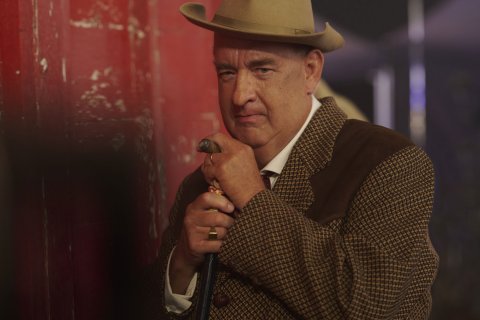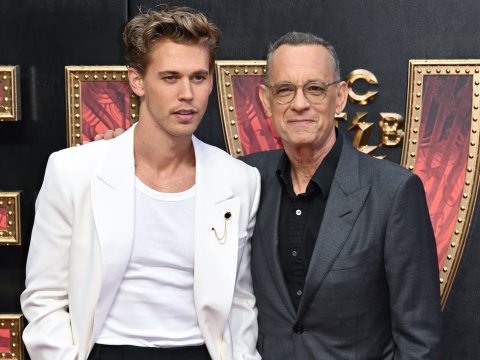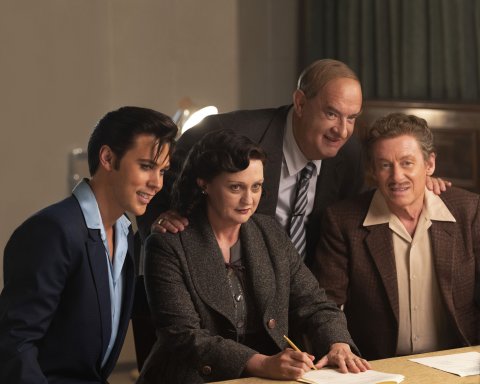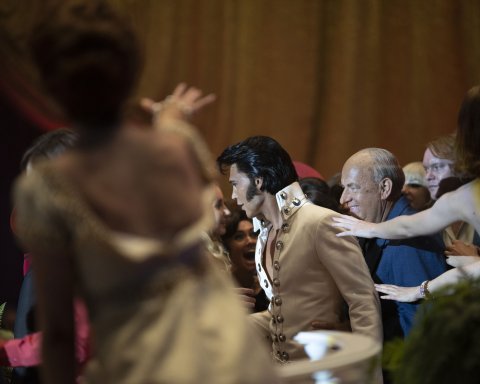
Even Tom Hanks thought he was an odd choice to play Elvis Presley's manager Colonel Tom Parker in director Baz Luhrmann's Elvis (opening in theaters June 24). "When Baz came in and first talked about Elvis, I couldn't figure out why in the world he would come to see me," Hanks recalls.
For one thing, Hanks had little interest in Elvis. For another, the actor specializes in decent all-American 'Everymen' and Parker was a mysterious wheeler-dealer who managed (some say exploited) the King throughout his singular career while remaining almost anonymous himself. Hanks remembers thinking, "I don't know what the man looks like. I've never heard his voice."
SUBSCRIBE TO THE PARTING SHOT WITH H. ALAN SCOTT
ON APPLE PODCASTS OR SPOTIFY
Still, Hanks says he was intrigued and only got more interested as he started researching Parker. What he found was a "devious mix of self-serving and moxie of genius somehow."
"There was not an artistic bone in Colonel Tom Parker," he says, "he didn't care about the music, he didn't care about the movies. He cared about the deals. He cared about making sure that his boy didn't just have a million dollars worth of talent, but actually had a million dollars."

Born Andreas Cornelis van Kuijk in 1909 in Holland, Parker came to the U.S. illegally in 1929. He made a living in circuses and carnivals across the South, before getting into music promotion for country stars like Eddy Arnold and Hank Snow. He was rewarded with the honorary title of colonel of the Louisiana State Guard after helping singer Jimmie Davis win the governorship in 1944. In 1955 he met a then little-known Elvis Presley. A year later with the release of "Heartbreak Hotel," Elvis became a household name.
Even music industry insiders knew little at the time about Parker, except that he was that heavy-set guy with an unplaceable accent getting 50 percent of Elvis' soaring earnings at a time when 10 or 15 percent was standard for managers.
Hanks says, however, that Priscilla Presley and Jerry Schilling, Elvis' friend and a member of the King's "Memphis Mafia" entourage, told him that Elvis was content with the deal. Parker was handling the promotion and merchandising of Elvis Presley, something no one else around the singer could or wanted to do. More than that, Hanks learned, Parker ingratiated himself to Elvis' inner circle. "I was prepared to hear horror stories about what an evil man the Colonel was, and both of them said, he was one of the most delightful men they've ever met: 'He was fun, he was joyful, when he came into the room it brightened up. He always took care of us.'"

"Was he a carny and a cheapskate? Was there malfeasance involved? Yes" Hanks says. Parker was "a self-serving promoter, let's not turn him into the most altruistic human being." Still, he "made Elvis Presley's dreams come true beyond his wildest imagination." It was Parker who doled out Elvis' TV appearances sparingly, making sure that fans who wanted to see him would have to pay for a ticket. He came up with the idea of "greatest hits" albums to keep Elvis in the public eye while he served in the Army. He was also behind Elvis' lucrative movie career, his pioneering Las Vegas residencies and Aloha from Hawaii via Satellite, one of the first satellite broadcasts which was seen by 1.5 billion people around the world. After Elvis' death, Parker continued to represent him, even though a judge in 1980 ruled his management to be unethical. He died in 1997 in Las Vegas.
So why would a movie star who is famous worldwide for portraying earnest good guys like Forrest Gump, Sully Sullenberger, Jim Lovell and Mister Rogers try to convince audiences that he is somebody as morally murky as Tom Parker?
"The reason I take jobs is because I think the guys are fascinating," Hanks says, "Look, I'm 66, you can only throw yourself into these kinds of things when I feel as though I'm going to be able to truly examine some brand of authenticity. I'm not interested in playing bad guys for the sake of bad guys."
Hanks admits getting audiences to see past "Tom Hanks" is a challenge. "I've woken up as Tom Hanks every day for the last 66 years,' he says with a laugh, "I've made my peace with it."
"I have a certain kind of countenance. You carry that with you into every single one of your films. And I must say, too, when I saw what the Colonel sounded like and what he looked like, it was so far away from myself. That's a luxury for an actor in order to jump in, if you can pull it off." Hanks became Colonel Tom onscreen with the help of a prosthetic nose and an accent which has baffled some critics.
As for the audiences themselves, Hanks says they know as well as actors, that movies require the suspension of disbelief. "I think everybody makes a deal with the art form, everybody knows that it's a movie. If you got to see the same guy over and over and over again, that's like looking at a variety show and I'm just the host of it. I think the deal anybody in movies has with the audience is to come on in and I'll show you something you haven't quite seen before."
"Am I familiar? Absolutely. Very few movie stars are mysterious. They might be a little bit mercurial. It's an understood contrivance between the artist and the audience where the audience comes in and says, 'I have enough faith in you to take me places I haven't gone. You haven't let me down too many times before.'"

Hanks says he was also trying to capture the good and bad he found in the complex relationship between the oddball manager and his oddball client. Hanks says, "Baz was going for something that I had never seen before. And anytime you're going to be able to explore something that you think you know the story, and then you find out all this other stuff, I think that's a cool way to make a movie."
"There was also the dynamic of the puppet master behind the artist that I wasn't interested in doing because it's always some guy saying, 'No, you can't do this, you have to do that. I know you don't want to sing that song but you're going to have to sing this song.' And that was not the case in the relationship between the two," Hanks says.
"The Colonel didn't care what song Elvis was performing the first time he saw him. What he noticed was his effect on the audience. And I understand that. That's not a guy who goes, 'Oh, I'll be able to turn this guy and bend him to my wishes.' He actually saw this guy on stage, turning a crowd of women into sheer unadulterated banshees, experiencing something primal in himself. That was what was fascinating about the man."
Listen to H. Alan Scott's full conversation with Tom Hanks on Newsweek's Parting Shot. Available on Apple Podcasts, Spotify or wherever you listen to podcasts. Twitter: @HAlanScott
















